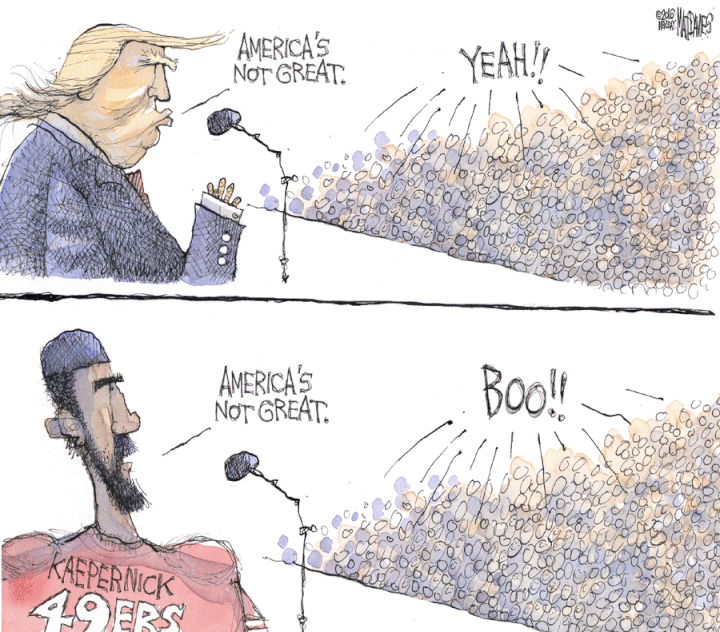Student suspended for not standing at pledge of allegiance
Anonymous
The PP here. You sound a bit more reasonable now, so thanks. There are an entire group of moderates who were left with two terrible options, and our decision was driven by issues. (I dislike Trump on a personal level.) Some of the issues we agreed with fell on the D side, like pro-choice and gay marriage (speaking for myself), but others, which fell on the R side, took precedent, such as stricter immigration control (particularly illegal immigration), a reduction in corporate tax rates to a globally competitive level (to reverse the trend of off-shoring comoanies), and a few others. Nothing is black or white. Mature adults weigh their options, fully realizing there is no perfect choice (and in this election, that's an understatement), decide for themselves what is best for the country, and vote accordingly. Do I wish Trump would stop the tweeting nonsense? Of course. Do I wish he came out stronger, the first time, against the KKK? Yes. (Do I believe his supports the KKK? Of course not.) Am I happy about the immigration proposal he is sending (or has sent) to Congress? Absolutely. Am I glad he is trying for a 20% corporate tax rate? You bet. Do I like that he's lowering taxes in the ultra-wealthy? No, I do not. Point is, life and its related decisions are complex, and we all have to figure our priorities. P.S. I'm not even Christian, so your last point certainly doesn't apply to me, or many Trump voters, but I will acknowledge that there is a far-right fringe for whom that rings true. |
Anonymous
| If you chose to vote for Trump, knowing what we all knew about him before the election, then you are responsible for the disasters he causes. No one could possibly think he was the better choice for our country. |
Anonymous
Well, 60 million voters thought he was the better choice, so there's that. |
Anonymous
I dunno, I think "Make America Great Again" is a diss on America. It's saying we aren't great right now, aren't living up to our ideals. So what's the difference? |
Anonymous
And what % of those believe in creationism? Not really the brightest bunch... |
Anonymous
Difference is we're not a authoritarian state and apparently that's what greatness is. |
Anonymous

|
Anonymous
They on is then all, but only as applied to white Christians. |
Anonymous
Indeed they did, and they are responsible for the disasters he causes. |
Anonymous
Nailed it. |
Anonymous
| As a conservative and a former teacher, I believe this is wrong. Student should not have been suspended. A student does not need to stand or say the pledge, but a student cannot prevent or disrupt others from doing so. |
Anonymous
TAKE CIVICS!!!!!! Please. The 1st Amendment applies to government actors, not private entities, like private colleges or private groups at public colleges. And it is not absolute. If there is imminent danger of physical harm, the university can prevent things like riots. |
Anonymous
+1 |
Anonymous
I am also a conservative and former teacher... what is the mechanism for not preventing or disrupting? Is that not protected speech as well (for example, putting fingers in ears and singing la la la la loudly?). I am not being snarky--truly curious how I would manage to (LEGALLY) create a respectful zone for those who participate or abstain. |
Anonymous
That's a legitimate question. The court says you can't require participation in the pledge (and, by implication, the national anthem). The court does not say that any disruption equals free speech. Doing what the NFL players have been doing, for example, silently taking a knee, does not create a disruption that impairs anyone else's participation in singing the anthem. A student sitting quietly while the others stand to say the pledge is not being disruptive. If a student engages in activity that would be disruptive regardless of what the class was doing (e.g., if the class was hearing a presentation, watching a movie, doing math problems, etc.) then, as long as the punishment for the disruption during the pledge is the same as the punishment for disrupting any other class activity, you're on pretty solid ground. |
